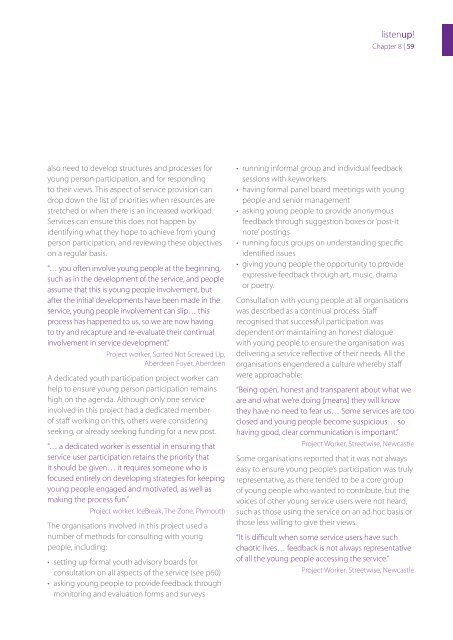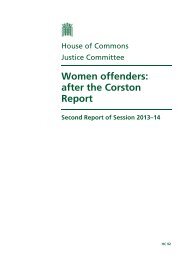Listen Up - Social Welfare Portal
Listen Up - Social Welfare Portal
Listen Up - Social Welfare Portal
Create successful ePaper yourself
Turn your PDF publications into a flip-book with our unique Google optimized e-Paper software.
listenup!Chapter 8 | 59also need to develop structures and processes foryoung person participation, and for respondingto their views. This aspect of service provision candrop down the list of priorities when resources arestretched or when there is an increased workload.Services can ensure this does not happen byidentifying what they hope to achieve from youngperson participation, and reviewing these objectiveson a regular basis.“… you often involve young people at the beginning,such as in the development of the service, and peopleassume that this is young people involvement, butafter the initial developments have been made in theservice, young people involvement can slip… thisprocess has happened to us, so we are now havingto try and recapture and re-evaluate their continualinvolvement in service development.”Project worker, Sorted Not Screwed <strong>Up</strong>,Aberdeen Foyer, AberdeenA dedicated youth participation project worker canhelp to ensure young person participation remainshigh on the agenda. Although only one serviceinvolved in this project had a dedicated memberof staff working on this, others were consideringseeking, or already seeking funding for a new post.“… a dedicated worker is essential in ensuring thatservice user participation retains the priority thatit should be given… it requires someone who isfocused entirely on developing strategies for keepingyoung people engaged and motivated, as well asmaking the process fun.”Project worker, IceBreak, The Zone, PlymouthThe organisations involved in this project used anumber of methods for consulting with youngpeople, including:• setting up formal youth advisory boards forconsultation on all aspects of the service (see p60)• asking young people to provide feedback throughmonitoring and evaluation forms and surveys• running informal group and individual feedbacksessions with keyworkers• having formal panel board meetings with youngpeople and senior management• asking young people to provide anonymousfeedback through suggestion boxes or ‘post-itnote’ postings• running focus groups on understanding specificidentified issues• giving young people the opportunity to provideexpressive feedback through art, music, dramaor poetry.Consultation with young people at all organisationswas described as a continual process. Staffrecognised that successful participation wasdependent on maintaining an honest dialoguewith young people to ensure the organisation wasdelivering a service reflective of their needs. All theorganisations engendered a culture whereby staffwere approachable:“Being open, honest and transparent about what weare and what we’re doing [means] they will knowthey have no need to fear us… Some services are tooclosed and young people become suspicious… sohaving good, clear communication is important.”Project Worker, Streetwise, NewcastleSome organisations reported that it was not alwayseasy to ensure young people’s participation was trulyrepresentative, as there tended to be a core groupof young people who wanted to contribute, but thevoices of other young service users were not heard,such as those using the service on an ad hoc basis orthose less willing to give their views.“It is difficult when some service users have suchchaotic lives… feedback is not always representativeof all the young people accessing the service.”Project Worker, Streetwise, Newcastle
















